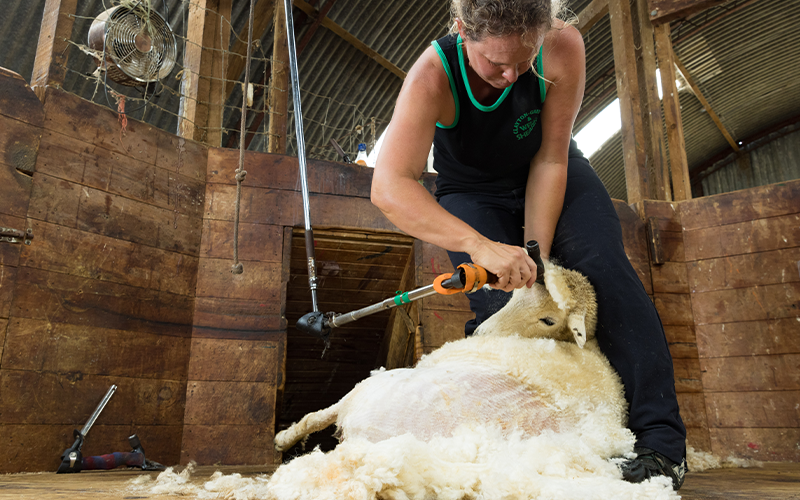As a career that’s etched in the culture of New Zealand farming, sheep shearing is so much more than simply ‘another job on the farm’. As well as providing a viable pathway for young aspiring farmers to other agri-jobs, and even farm ownership, it’s given countless young men and women a work ethic and attitude towards life, which could be found in few other careers.
Emily Welch, one of NZ’s most successful shearers, believes it has given her everything and more, from rising to the top of a sport, setting world records, to being able to purchase land with her husband and fellow champion shearer Sam Welch.
Emily was first exposed to the sheds through her father, Philip Woodward, who was also a shearer and a farmer, but you could say her motives weren’t your conventional ones to pick up the handpiece.
“The lightbulb moment for me to take up shearing was when my dad used to do a whole lot of trade lambs and then he’d shear [them] himself; and in our uni holidays it was woolhandling 101 for us and I really didn’t enjoy that,” Welch said.
But it wasn’t until after she finished her university degree and her dad took her to a shearing show that her competitive nature kicked in and she really caught the bug.
After returning from the UK following a short stint of shearing, she managed to secure her first stand doing a main-shear, which she says was unusual for anyone starting out.
“So I got my first job in NZ with Dean Ball and that was in 2002, and once I got that first season under my belt getting a job was a lot easier,” she said.
“I’ve always been really grateful that Dean gave me that opportunity, as it’s almost unheard of for people to get straight onto a stand, especially as a woman.
“The opportunities are there, you’ve just got to be open about what you want to do, and you can’t skip any steps.”
Emily Welch
She and Sam now run a successful shearing contracting business in the Northern-Waikato region.
For a young person wanting to get into the industry, Emily says there’s always work, and the opportunities can be endless, but you’ve got to be prepared to work hard and start at the bottom.
“Just approach a contractor [and ask for an opportunity]. A lot of our people who start as woolhandlers and pressers, [but] I’ll always try and put them on a stand each year to give them a chance,” she said.
“And most contractors will do that; the opportunities are there, you’ve just got to be open about what you want to do, and you can’t skip any steps.
As an employer now herself, Emily says she has seen first-hand what getting a season or two of shearing does for people, both personally and professionally.
“Shearing builds an amazing work ethic, it takes a pretty determined person and there’s even an element of perfectionism in it too,” she said.
“So I’m always having to do a lot of references for our staff, and it’s always a massive tick for them [future employers in the industry] to know that they’ve worked in the sheds.”
One downside for some is that shearing is a seasonal profession, although for a young person wanting to gain travel experience, a job in the woolshed can be a perfect fit.
For a young person it eliminates the need for long-term commitments both while traveling and in NZ, compared with the likes of a salaried job.
Emily says she used this to her advantage, and throughout her shearing career has managed to travel the world.
“Working in the sheds is one of the best jobs to get travel under your belt, there’s so much of the world you can see while you are getting paid pretty well.
Although the wool industry is seen as a desirable career path for many, Emily says there is plenty of work that needs to be done in attracting young people, and it starts with the more experienced shearers.
“I think it’s very important that the older shearers with loads of experience are spending the time to talk to the younger ones and pass on what they know rather than keeping it to their chest,” she said.
“And so I think to make sure it’s seen as a good job to go to, we’ve got to make sure we’re passing on the knowledge to those younger generations. “
She also stressed that if these young shearers are wanting to continue shearing in the long-term, it’s important that they make both their physical and mental health a priority.
“Nutrition, hydration and technique are very important if these shearers want a long fulfilling career in the industry,” she said.
“But It’s also so important for these young people to be realistic with themselves, and to have a life outside of shearing, because sometimes they can become obsessed with it, and from my experience that’s not sustainable.
There are a growing number of training resources in the shearing and woolhandling industry, including WOMOlife, an online and in-person training programme which arms aspiring shearers and woolhanders with the necessary skills and knowledge so they can hit the ground running.
Disclaimer: Dean Williamson, CEO of AgriHQ, is an Agricademy shareholder
More: If you want to know more about Emily Welch, check out the On Farm Story featuring her and her husband Sam below.










